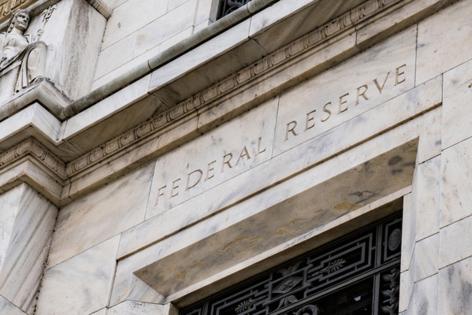Here are the 5 contenders to replace Jerome Powell as Fed chair
Published in News & Features
WASHINGTON — Five contenders are still standing in the high-stakes race to be the next Federal Reserve chair.
Treasury Secretary Scott Bessent on Monday confirmed the candidate pool has been cut roughly in half, with current Fed Governors Christopher Waller and Michelle Bowman, former Governor Kevin Warsh, White House National Economic Council Director Kevin Hassett and BlackRock Inc. executive Rick Rieder remaining.
Bessent, who is leading the vetting process, has said he plans to do another round of interviews with the aim of presenting a “good slate” to President Donald Trump after the Thanksgiving holiday.
Investors and Fed watchers are closely following the ins and outs of the selection process to replace Jerome Powell — whose term as chair ends in May — given Trump’s efforts to exert more influence over the central bank and its interest-rate decisions.
Here’s a look at the candidates.
Kevin Hassett
Hassett is currently director of the White House National Economic Council, making him one of Trump’s top advisers and allies. He also served in the White House during Trump’s first term. His earlier career included stints as a Fed economist and at the American Enterprise Institute, where he was director of research.
Hassett has aligned closely with the president on Fed-related matters. Earlier this year, as Fed policymakers held interest rates steady for several months, Hassett echoed Trump’s criticisms of Powell and accused the central bank of “falling behind the curve” on rate cuts.
He has also suggested the Fed has — through its own actions — put its independence and credibility in jeopardy, mirroring “mission creep” criticisms that Bessent has directed at the central bank.
Chris Waller
Waller has been serving on the Federal Reserve’s Board of Governors since 2020, after being appointed by Trump. He has long been a champion of central-bank independence, and is known for making prescient — sometimes out-of-consensus — calls on the economy in recent years.
In 2025, he became the first Fed governor to call for a resumption of rate cuts, warning about growing signs of weakness in the labor market. A string of disappointing jobs reports over the summer vindicated his early call.
While Waller, a Ph.D. economist, is currently calling for the lower rates Trump wants, his friends and associates say he isn’t willing to sacrifice his reputation as a credible economist for political or personal gain.
He could, however, prove a willing partner to changes at the Fed, such as streamlining operations and cutting costs. He’s also backed the idea that the Fed should keep out of controversial political issues, such as diversity efforts and climate change.
Michelle Bowman
Bowman currently serves as the Fed’s Vice Chair for Supervision. Trump appointed her to the Board of Governors in 2018, and promoted her earlier this year.
Bowman, who goes by the nickname “Miki,” is a fifth-generation banker and served as the state banking commissioner of Kansas before coming to the Fed. A lawyer by training, she also held posts in the George W. Bush administration and as counsel to U.S. House committees.
Since becoming Vice Chair for Supervision in June, Bowman has spearheaded plans to roll back a key capital rule for big banks and supported the withdrawal of standards that required banks to detail how they managed climate-related risks.
She was also an early backer of rate cuts this year and, along with Waller, dissented in July against a majority decision to hold rates steady.
Kevin Warsh
Warsh served as a Fed governor from 2006 to 2011 and was the youngest person ever appointed to the board. During the Great Financial Crisis, his experience and contacts on Wall Street proved pivotal for the Fed. In 2017, he was nearly Trump’s pick for the top job at the central bank, but lost out to Powell.
Since leaving the Fed, Warsh has frequently criticized the institution, and has recently called for a regime change: “It’s about breaking some heads, because the way they’ve been doing business is not working,” he told Fox News in July.
Warsh has been particularly critical of the Fed’s balance-sheet expansion, aligning with Bessent’s own views. He’s also argued the Fed would be able to cut rates more by aggressively downsizing the central bank’s portfolio. His current openness to lower rates bucks his longstanding reputation as an inflation hawk.
Rick Rieder
Rieder is one of the most senior executives at BlackRock, overseeing the firm’s fixed income business. He joined the company in 2009, following nearly two decades at Lehman Brothers Inc.
In a September interview with CNBC, Rieder argued that, based on his reading of economic conditions, the central bank should opt for an outsize, half-point rate cut. The Fed ultimately lowered rates by only a quarter point.
He also said Fed independence is “critical,” since investors need to have confidence in the dollar, debt and debt financing, but added that the central bank could be more “innovative.”
Bloomberg News has reported that when he interviewed with Bessent for the chair job, the Treasury secretary was impressed with Rieder’s long career in markets running large groups of employees, and his deep understanding of micro- and macro-economic dynamics.
_____
(With assistance from Nancy Cook, Saleha Mohsin, Catarina Saraiva and Katanga Johnson.)
©2025 Bloomberg L.P. Visit bloomberg.com. Distributed by Tribune Content Agency, LLC.







Comments